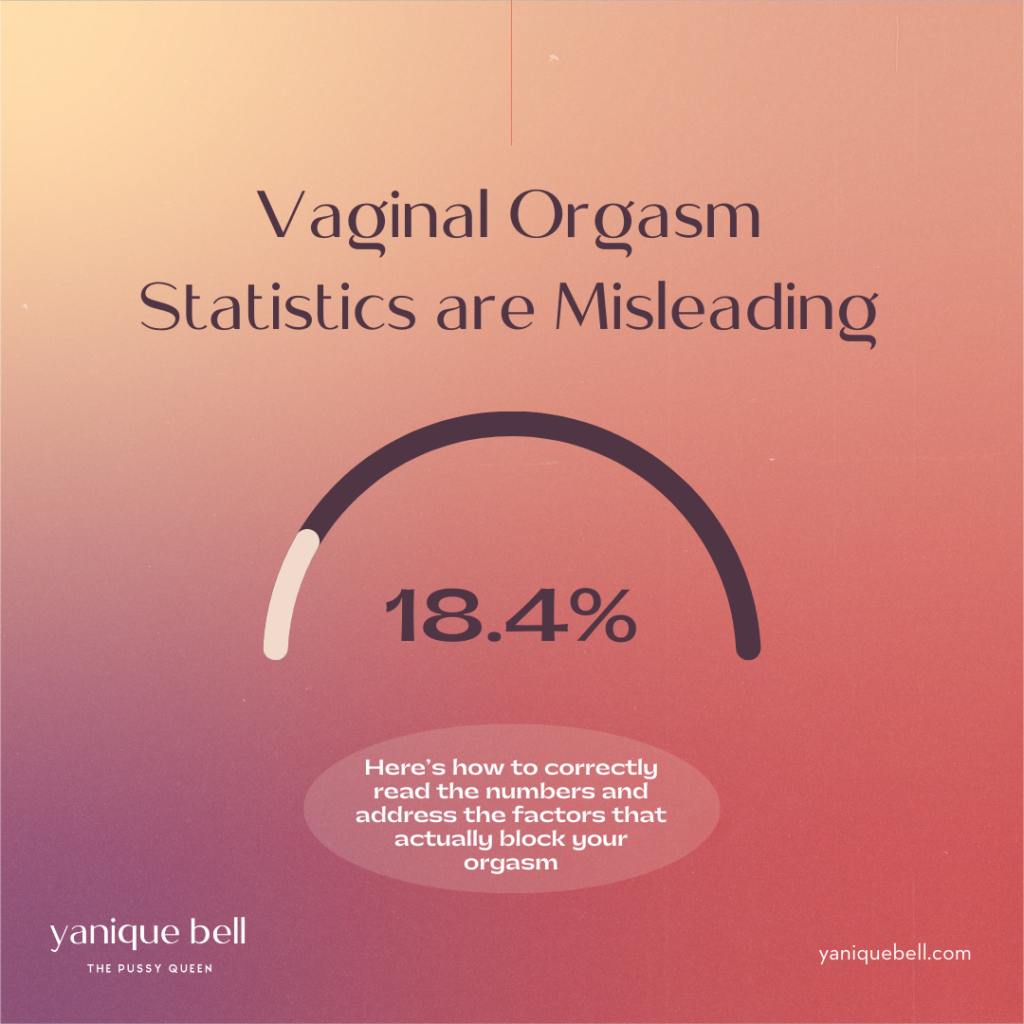
“Only 18.4% of women orgasm from vaginal sex alone. (Source)” Have you seen this vaginal orgasm statistic going around?
When I became sexually active in my early 20s, I had been blogging about reconnecting with my pussy and reading a ton of sex-ed books to help me overcome what felt like an insurmountable mountain of sexual shame. When I started to have sex, I realized it wasn’t like what I had seen in porn. I was really turned on and into it… all the way up until my partner actually put his penis in my vagina. At this stage, sensitivity would go blank and so would my mind. I would freeze up. When thoughts returned, it was me, by and large, wondering if something more was supposed to be happening…

Wasn’t this supposed to feel… better? Where did all the pleasure go that had been building up just moments before? Why can’t I feel anything…?
So, one evening, I popped onto Google and found an article from a trustworthy site… and my stomach dropped. An anxious heat filled my chest. This article claimed that women are largely numb in the vagina and that this was normal. It said there weren’t many nerve endings in the vagina and cervix and, if you want an orgasm, focus on the clit.
I was absolutely stunned, disappointed, and devastated. I sat with that sinking feeling for a while, trying to wrap my head around this new reality — one where I would never experience a vaginal orgasm. I tried to tell myself it wouldn’t be so bad. Sure, I couldn’t really orgasm from fingering, unless *I* was doing the fingering 😅 But maybe, I could start using a vibrator during sex. Or maybe, my partner could get better at fingering…
These are reasonable consolations. But they weren’t what I wanted.
I told myself, I could be ok with these options, but the truth was I wasn’t. I hated that reality. It made me fucking miserable just thinking about it. I wanted more for my sex life. There was absolutely no way that was true.
You see, I am a stubborn optimist. I don’t take what I’m given because it’s the first thing that’s in front of me. I genuinely believe anything is possible. And I’m so fucking grateful for that, because that thought pierced through the anxiety fog and, in that moment, I remembered something…
In my sexual re-education, I had read stories about women who had trained their bodies to the extent that they were able to orgasm for hours from the slightest touch. Now, I didn’t need to orgasm for hours. I just wanted one juicy vaginal orgasm. And I thought, “Well, if that’s possible in their bodies, what’s possible in mine? How can I train my body to orgasm differently?”
Cognitive Fallacies When Assessing Vaginal Orgasm Statistics and Sex Statistics
The problem with vaginal orgasm statistics and sex statistics in general is that we usually go looking for them when we’re already in a doubtful place. We go searching on Google because we want to know if what we’re experiencing is normal. And secondly, we want to know if there’s a chance we could experience something else.
So, already we’re primed to interpret the numbers against our favor. Our emotionally vulnerable and hopeful state means the odds could either crush our spirits or inspire action.
Luckily, I had other data in my mind. I had the stories of wildly orgasmic women who weren’t born that way but had trained their bodies to be that way. This meant that regardless of the numbers, I already knew I could TRAIN my body to orgasm differently. That meant there was nothing remotely wrong with my body, I was just missing the knowledge of HOW TO TRAIN my body to orgasm differently.
The problem is though, a lot of us take this statistic and we
- a) believe it right away and give up on our vaginal orgasm or
- b) take it to a doctor who then gets us on steroids and unnecessary medication that don’t remotely guarantee you an orgasm.
(Because they physiologically can’t!! There is no pill for an orgasm. Sure, there’s a pill to keep men hard, but lasting doesn’t equate enjoying. Orgasming is a multi-faceted experience and not one that you can fix through medication alone.)
And honestly, I’m extremely lucky “I knew better.” Even though I too almost fell victim to these cognitive fallacies:
1. Authority Bias
We tend to believe people and institutions that hold authority in our eyes. For me, this was a well-known sex-ed website. And the medical field. Of course, we do want to give reasonable credence to credible sources, but we also want to think critically when interfacing with any institute or person of “authority.” The science on female sexuality is incredibly young. We are only beginning to understand female pleasure and what motivates us sexually. When you understand that not all medical professionals are trained equally and that it takes over a decade for leading-edge research to even make it into your doctor’s office and become well-known, you start to take everything in with a new perspective…
2. Confirmation Bias & Expectation Bias
Again, you’re in a very vulnerable place emotionally when you read these statistics. The anxiety of not being able to have the kind of sex you’ve always dreamed of fogs your brain, and as women, we are programmed to associate pain and disappointment with our pussies. We don’t realize it, but in so many places, we are still subtly told that it sucks to be a woman. We almost expect to have miserable, lackluster sex lives. If you’ve experienced or are experiencing depression or anxiety, your brain is already in the habit of thinking and feeling this way. You’ll accept that statistic without even questioning it. You just crap-fit it into your worldview.
3. Normalcy Bias
While normalcy bias usually refers to our ability to underestimate the possibility of disaster because we’re used to the status quo and what’s “normal,” I’m actually arguing that we do this with the possibility of positive outcomes as well. If you grew up around women who felt defeated about womanhood and didn’t have vibrant and pleasure-packed sex lives, you may have normalized sexual dissatisfaction and even pain during sex.
How to Correctly Interpret Vaginal Orgasm Statistics
The simple use of numbers and percentages creates authority bias. It’s actually a common tip in marketing — if you can simplify something into clear percentages, customers are more likely to trust you and buy from you.
But, here’s the thing. These numbers are projected probabilities based on a population survey. They are not science facts. They don’t reflect what’s possible in your body.
This number isn’t saying “only 18.4% of women will orgasm vaginally ever.”
It’s saying, “Based on our sample of women, 18.4% reported being able to orgasm vaginally. We have no idea how many of these women are naturally gifted at orgasming vaginally and how many have trained their bodies to orgasm this way. We have absolutely no clue what level of sexual education these women have or even how other factors, like sexual confidence, shame, relationship trauma, numbness, etc. are affecting their ability to connect with their vagina. We are not telling you anything actually helpful for your personal orgasm journey. Just shooting out a random ass number because people are incredibly entertained by sex statistics and it just felt nice to do. Sorry for any years of pleasure we steal from you because we’ve effectively killed your spirit with this number. Oh well. Good luck out there.”
Just because you’re looking at numbers, doesn’t mean the subject matter is objective.
Sex is notoriously subjective.
Yes, there’s objective science about our bodies, but sexuality is subjective. It’s not about mechanics (finger or penis going in and out of the vagina). Your vagina is a place of immense emotion and sensitivity. Neurologically, your vagina is connected to your heart, limbic system, and mind. Everything about pussy stretches us beyond just the mechanical and physical. If we want outrageously good sex, we have to engage our entire being…
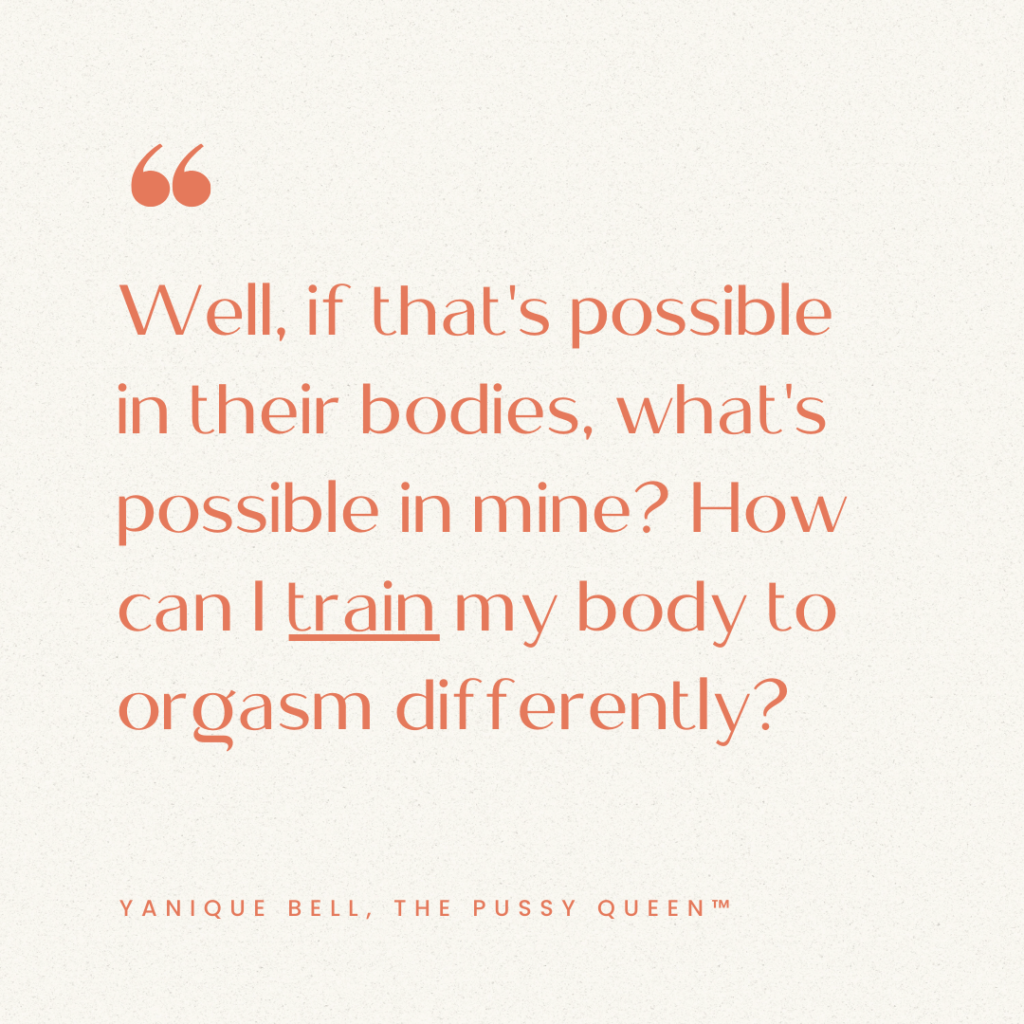
This is What Actually Determines if You Can Have a Vaginal Orgasm
I don’t want you living in the dark anymore. Stop wasting years of your sex life, not having the orgasms you really want to!! Truly, there is no need for your sacrifice, darling. Forget about the vaginal orgasm statistics. They don’t mean sh*t. Here are 10 factors that actually do impact your ability to vaginally orgasm:
Somatic Awareness
Your ability to perceive sensations and physical touch in your body is a skill that you can sharpen and develop with time and practice. What I love about starting with the basics of building somatic awareness, rather than going straight to different sex tricks and sex positions, is that it takes you to the root of the problem. You’re not orgasming just because you’re in the wrong position for pleasure. Most likely, you’re not tuned into your vagina at all. You’re not making things up, you genuinely can’t feel anything down there. No, that’s not permanent. As long as you don’t have serious nerve damage (and even then, there’s still hope. Heard of phantom limb? Your brain can still perceive pleasure and pain even if you’ve experiencing neural damage or have had any part of your reproductive system altered or removed. Don’t lose hope. In my programs, you’ll hear me refer to this as “working with the energy” of any absent parts or connections.), through conscious and consistent practice you can drastically improve your somatic awareness and pleasure sensitivity. Major plus? The brain catches on pretty fast. Give yourself 1 – 3 months in Vaginal Rejuvenation and you’ll start to see results quickly.
Pleasure Sensitivity
Pleasure sensitivity refers to your ability to detect, sense, and respond to pleasurable stimuli, such as touch and pressure. Due to the volume of nerve endings in the clitoral glans (over 8,000!!! Slay gurl, slay!), the vagina is often neglected as a source of pleasure and orgasm. Hence the annoyingly persistent belief (even in the medical field 🙄) that the vagina and cervix are generally numb or only minimally sensitive, insufficient of producing an orgasm on their own.
The vagina is rich with nerve endings and pleasure hot spots that, when turned on, can produce deep, emotional, and liberating orgasms. You just have to know how to retrain that pussy. I can help with that.
Join the Pleasure Newsletter:
Vaginal Tone
The stronger your pelvic floor and vaginal muscles, the stronger your orgasm. You may already be having small or faint vaginal orgasms without even realizing it, simply because your vaginal tone is low. Increasing vaginal and pelvic floor tone not only strengthens your orgasm, but is foundational training for expanding into full body orgasms and squirting. Plus, maintaining your muscle tone is essential for cultivating a healthy and happy pelvis and preventing prolapse and incontinence.
But, beware. You don’t want to proceed with building vaginal and pelvic floor tone if you have excess tension and pain in the pelvis. Doing strengthening exercises on top of an already pressure-packed pelvis is going to lead to a major ouchy. Inside the Vaginal Rejuvenation program, you’ll learn exercises, breathwork, stretches, and somatic healing techniques to release excess tension and soothe the vagina and pelvic floor, so that you can relax open and effectively build tone.
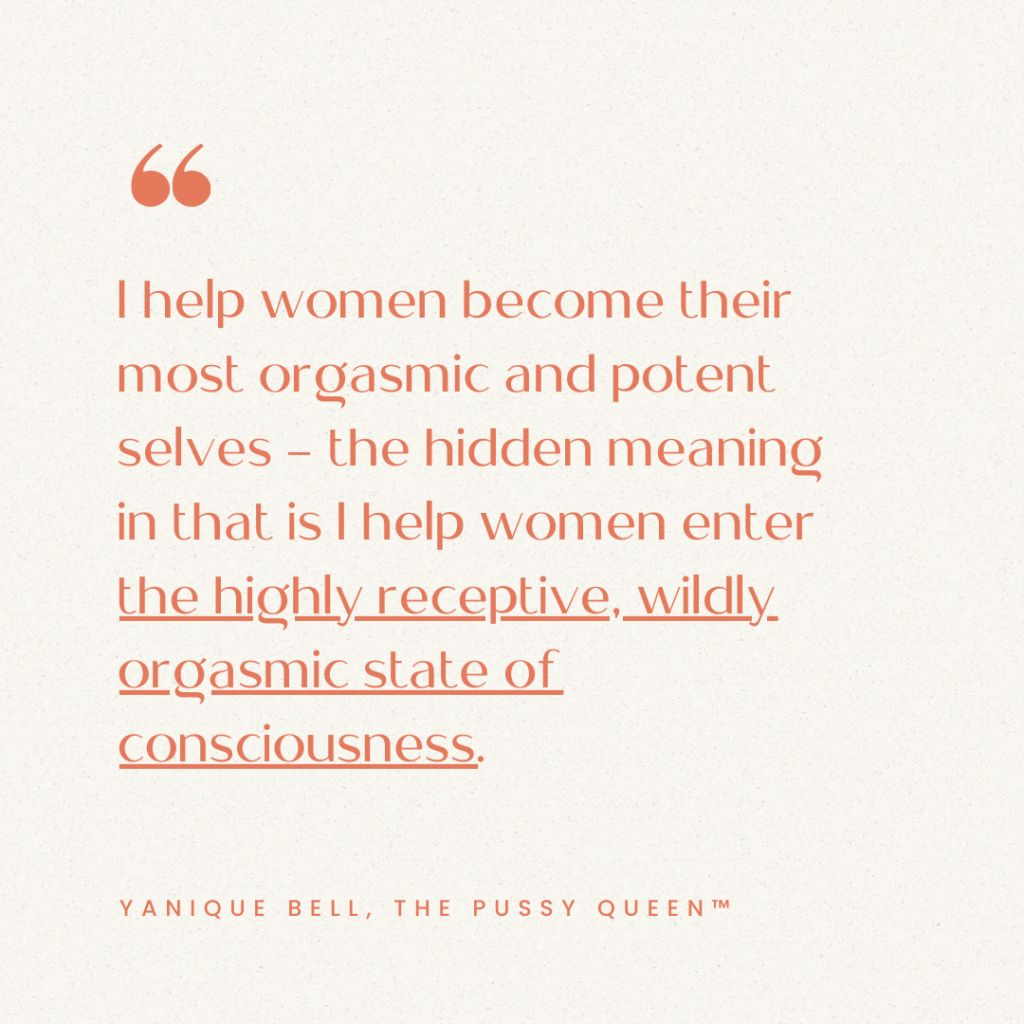
Nervous System Regulation
In order to experience the shift into the highly receptive state, we need to master nervous system regulation. If you had a largely healthy and stable childhood, then you may already be pretty good at regulating your nervous system without even realizing it. However, if like me, you experienced complex trauma and are recovering from the effects of PTSD/CPTSD, regulation is a skill you’ve had to learn in adulthood (sometimes painstakingly 😅).
Healing our childhood and adult wounds and learning to how to regulate our nervous system is one of the most empowering and beneficial things you can do to support your thriving in every area of your life: orgasmically, relationally, financially… This is an essential life skill. Plus, chronic stress and unprocessed trauma blocks our receptivity to sexual stimuli on the cellular level, making it harder for us to get wet, turned on, and emotionally ready for physical intimacy.
Your Personal Brakes and Accelerators
Your personal disposition towards sexual stimuli also impacts your orgasm. In order to become aroused, you have to learn what pumps your brakes and what activates your accelerators — in other words, you have to learn what makes your pussy purr. And the biggest sex organ we all have is our brains. How we think and feel about pleasure directly impacts our sexual enjoyment. Imagine trying to enjoy a meal you fundamentally feel disgusted by. (For me, that’s oysters. The slimy texture takes me out. I don’t care how you try to spice it up, I literally cannot.) If you’re carrying feelings of shame, disgust, and fear around sex, they’re gonna pump your brakes and mess with your accelerator.
Our emotions around sex and womanhood are best healed and explored in community. Women uniquely learn sex socially. Liberation is contagious. That’s why it’s so empowering and effective to join a program like PUSSY ACADEMY.
Menstrual Cycle
Each phase of your cycle inspires different ways of enjoying pleasure. For example, the contractions of an orgasm can initiate your period, so you may notice that your body craves vaginal sex just before your period. The ways in which our vagina and cervix speak to us throughout our cycle is unique for each of us.
Sexual Sovereignty
Leaky sexual boundaries or boundary violations, as a result of abuse or assault, greatly affect our vagina’s responsiveness to pleasure. Especially if you are recovering from people-pleasing, a chronic fawn response, or codependency, you may have allowed partners into your inner sanctum (even against your rational, better judgment). It’s not because you were being reckless or irresponsible. Your nervous system was/is stuck in a trauma response where you try to appease and take care of other people’s feelings (even when this person is a danger to your safety), completely disregarding your own. This can lead to a layer of “thick skin” and tightness in the vagina that is experienced as numbness. (To release this tension and reset your pussy, treat yourself to my the Vaginal Rejuvenation program.)
I help women reclaim their sexual sovereignty and access their soul’s true knowing again. You don’t have to feel debilitated by shame or guilt. You are not responsible for someone else’s hurt feelings that arise as a result of your boundaries. You get to say “no.”
Feminine Embodiment & Self-Concept
Do you tend to live in your head? Do you find yourself “performing” sexually rather than full-heartedly being in your body and your pussy?
There is a subtle shift that needs to happen in our perception of ourselves and how we take up space in our body, in order to ignite the pleasure receptors in the deep vagina and cervix. For many, this re-embodiment and re-sensitizing of the vagina feels like a rite of passage, a coming of age: “I finally feel like a woman. I finally feel whole.”
Our relationship with our vagina is directly linked with our perception of womanhood and how at home we feel in our bodies as women.
As you begin to attune more deeply to yourself and your pussy, you will naturally begin to embody your feminine energy on a deeper level. I teach feminine embodiment as an authentic expression of the real you and a softening into your soul’s original essence. This is in stark contrast to teachers who guide you to embody a specific subset of the “feminine.” Instead, I offer you the space to explore the dark, wild, potent, vast, and ever-changing facets of the feminine.
Rather than focusing on restricting yourself to the soft and frilly aspects of the feminine (which I love), I teach embodiment through attunement to your personal season and life cycle. Every phase demands a different you.
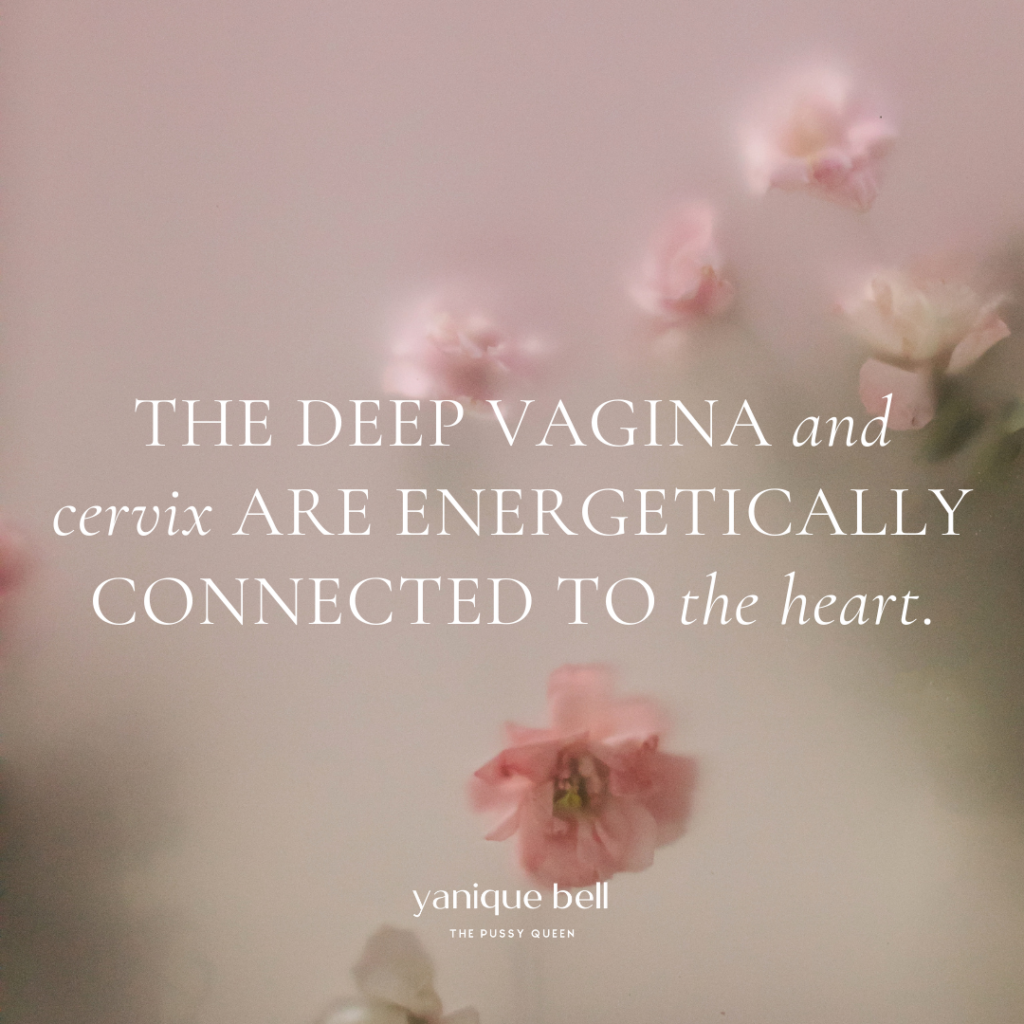
Love and Relationship Dynamic
The final key factor affecting your vaginal orgasm is your relationship to love. According to the Tantric and Taoist traditions, pussy is energetically connected to the heart. More specifically, the deep vagina and cervix are especially connected to the heart. Deeper penetration is profoundly vulnerable and emotional. When we’re feeling heartbroken, unloved, or recovering from trauma, the cervix may become tender to the touch and even painful. Our bodies recoil and resist deep penetration.
Healing our relationship wounds/trauma, maintaining healthy boundaries, and reconnecting to the consciousness of our heart is vital to restoring aliveness, ease, and orgasmic pleasure to the vagina.
Flip the “on” switch
Your vagina is rich with nerve endings and pleasure hot spots that, when turned on, can produce deep, emotional, and liberated orgasms. Flip the “on” switch: Start your Vaginal Rejuvenation journey now >>>
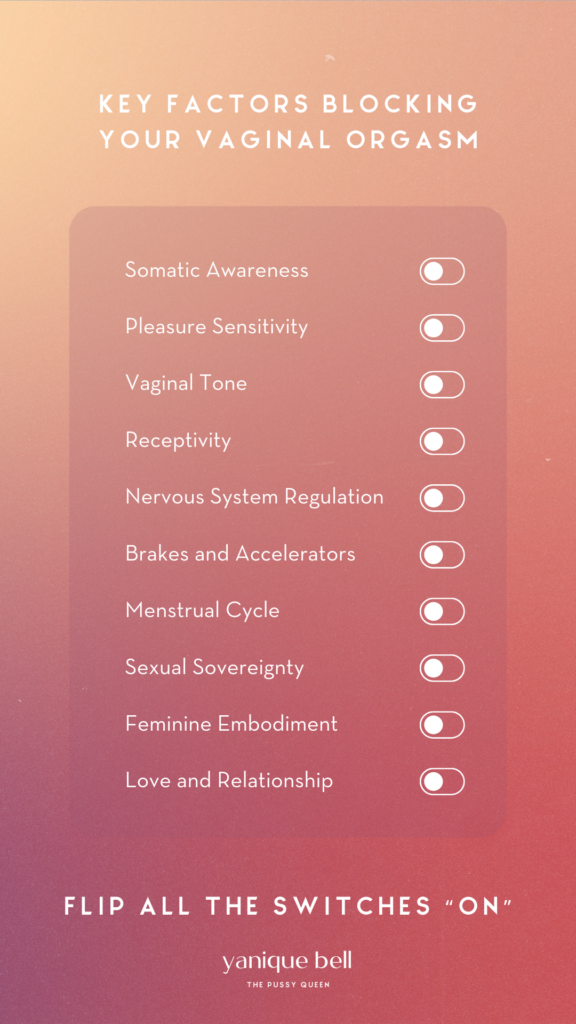
Don’t let vaginal orgasm statistics discourage you. Start your Vaginal Rejuvenation journey >>>

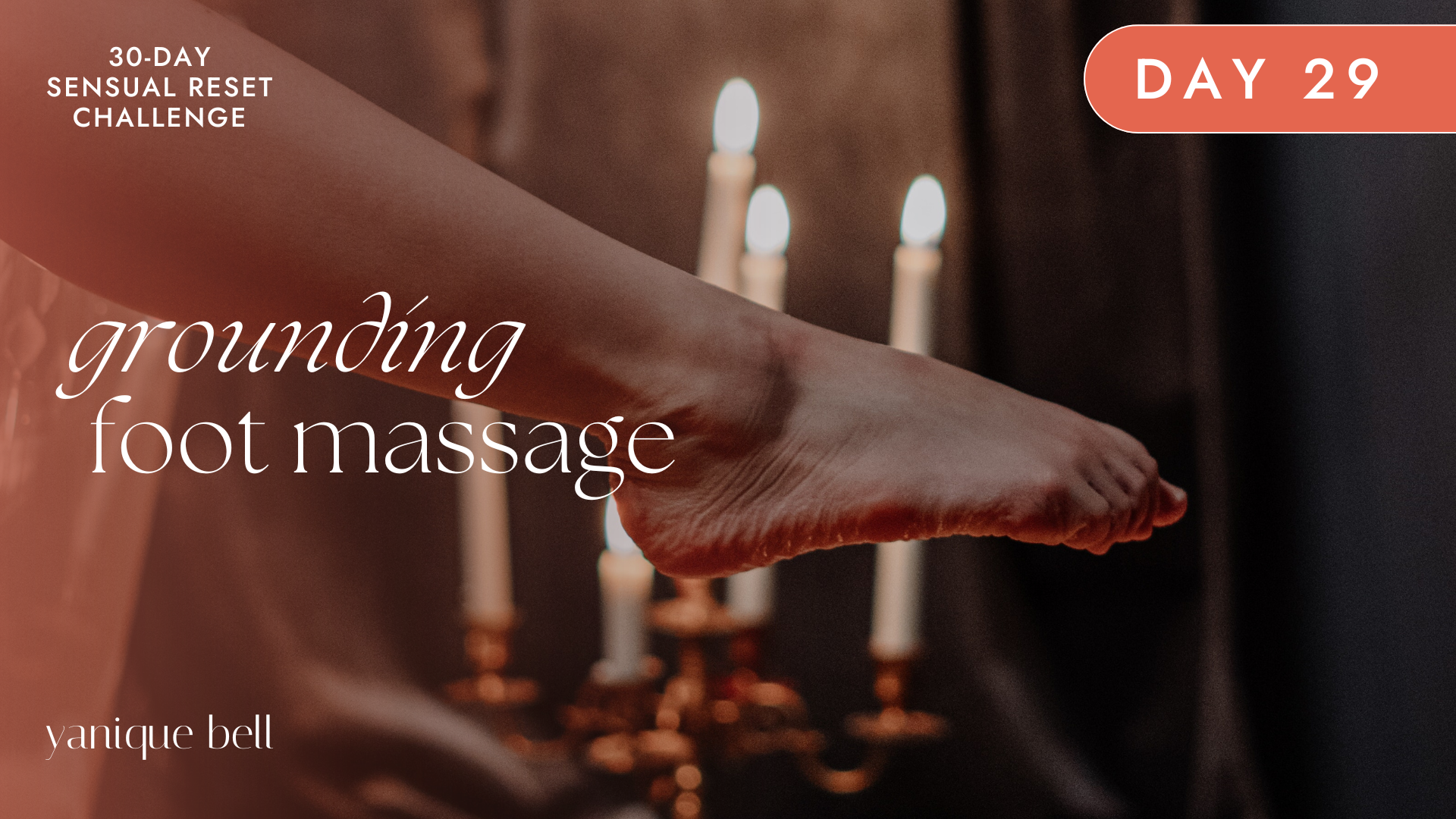
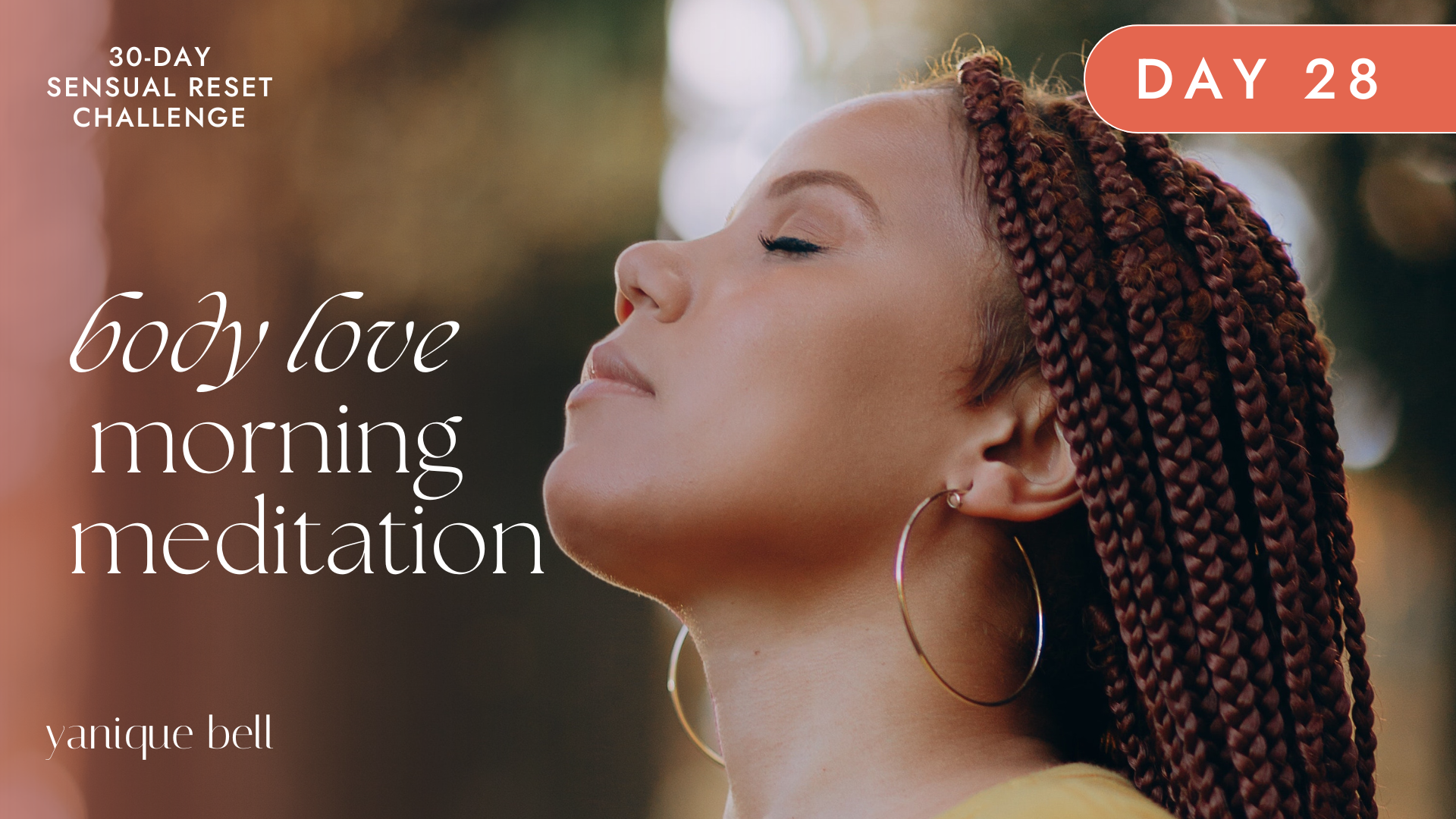
Comment on This Post